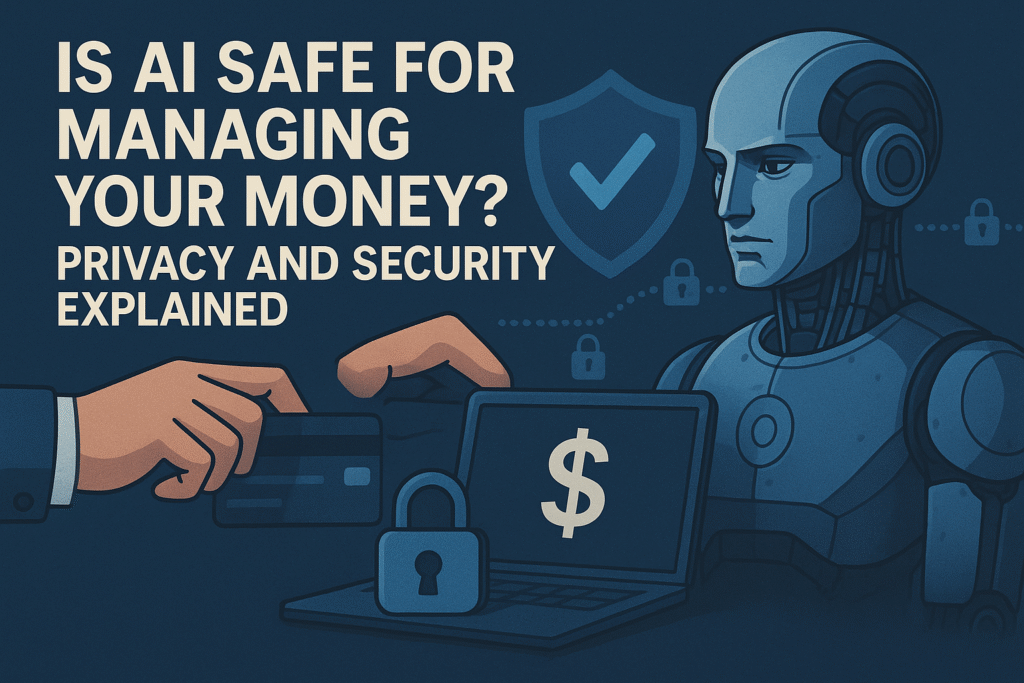
Artificial intelligence (AI) is now at the heart of personal finance worldwide—from budgeting and investing, to credit access and fraud prevention. But with so much sensitive information at stake, is AI actually safe for managing your money? This guide breaks down the security practices, real risks, and actionable steps to protect your finances—answering top privacy concerns for readers in the US and internationally.
Table of Contents
- How Does AI Manage Your Money?
- Major Benefits: How AI Improves Financial Security
- Privacy Concerns: What Are the Real Risks?
- Top Security Practices in AI Finance Apps (2025)
- US & Global Privacy Regulations to Know
- Tips: How You Can Stay Safe & In Control
- Conclusion: Is AI Worth the Trust?
How Does AI Manage Your Money?
Modern AI finance tools connect to your accounts (banking, credit cards, investments) through secure API connections. AI then analyzes patterns, categorizes spending, flags anomalies, and even suggests ways to save or invest smarter—all in real time. These systems can automate bill payments, optimize savings, forecast cash flow, and prevent fraud by detecting suspicious activity much faster than humans ever could.
Major Benefits: How AI Improves Financial Security
- 24/7 Fraud Detection: AI instantly flags suspicious transactions using advanced anomaly detection—preventing fraud and ensuring faster alerts for unusual activity.
- Automated Privacy Controls: The best tools encrypt your data, restrict access, and minimize human involvement—reducing the risk of breaches or insider misuse.
- Personalized Security Alerts: Get real-time warnings for late bills, large purchases, location/device logins, or category overspending.
- Identity Protection: AI uses biometric and behavioral analysis to authenticate you, making account takeovers harder.
- Better Regulatory Compliance: Top apps in the US and worldwide must now comply with robust privacy and data protection laws, offering transparency and consumer rights.
Privacy Concerns: What Are the Real Risks?
While AI brings many protections, there are also serious privacy risks to consider:
- Data Breaches: Any system holding sensitive info can be targeted by hackers. AI platforms must protect large troves of data against ever-evolving threats.
- Unauthorized Data Use: Some services could process or share your financial data with third parties for marketing or model training—especially if privacy policies are unclear.
- Algorithmic Bias: Poorly designed models might unfairly impact your credit scores or loan offers, reinforcing social or economic biases.
- Cybercrime & AI Vulnerabilities: Risks include prompt injection (tricking an AI model into revealing private data), adversarial attacks, or model leaks—especially with large language models.
- Non-compliance: Apps operating globally must respect regional laws (GDPR, CCPA, CPRA), but not all do—raising the risk of unlawful data processing.
Top Security Practices in AI Finance Apps (2025)
Reputable financial AI tools now deploy multilayer security:
- Data Encryption: All personal and financial data is encrypted—both in transit and at rest. Only you and the app can view transaction details.
- Access Controls: Multi-factor authentication, stringent login protocols, and activity monitoring for any access to your financial info.
- Data Minimization: Apps only collect what’s essential; unnecessary info is never gathered nor stored long-term.
- Regular Security Audits: Top apps undergo independent audits and maintain certifications like SOC 2, ISO/IEC 27001, and demonstrate regulatory compliance.
- Transparent Consent & Controls: You can view, export, and delete your data at any time.
US & Global Privacy Regulations to Know
- United States: Laws like the CCPA/CPRA require platforms to disclose how your data is used, provide opt-out and deletion rights, and maintain strict security standards.
- European Union: The GDPR gives consumers control over their personal data—including access, correction, and the right to erasure for any company operating in the EU.
- Asia & Beyond: Many nations (India, UK, Australia, etc.) are rapidly tightening privacy and AI regulation—bringing global apps to higher standards.
Tips: How You Can Stay Safe & In Control
- Use Only Trusted, Audited Apps: Stick with platforms that clearly explain security, privacy, and compliance—check for recent certifications.
- Review Privacy Policies: Confirm what data is collected, how it’s used, and if/when it’s shared.
- Opt for Apps with User Control: Choose tools that let you export, edit, or delete your information easily.
- Set Strong Passwords & Enable 2FA: Protect all financial and email accounts tied to your AI tools with unique passwords and two-factor authentication.
- Be Data Smart: Never submit sensitive info (like full card or government ID numbers) to AI chatbots or tools unless the provider is reputable and secured.
- Check Regional Compliance: If you’re outside the US, make sure your app follows your country’s privacy laws.
- Regularly Audit Permissions: Periodically revoke access for any integrations/services you no longer use.
Conclusion: Is AI Worth the Trust?
AI is safe for managing your money—if you choose reputable, secure, and transparent tools.
The best AI finance apps in the US and around the globe employ state-of-the-art data protection, real-time fraud monitoring, and privacy-first design. However, every technology has inherent risks, especially with sensitive data. It’s up to you to:
- Select audited, compliant apps,
- Understand your rights,
- Take advantage of built-in privacy and security controls,
- Stay vigilant and up-to-date with best practices.
When used smartly, AI can dramatically improve both the security and intelligence of your personal finance—empowering you with less stress, better protection, and more confidence in your financial future.
Want to stay informed? Follow our AI & Finance Privacy guides for the latest updates, secure tool reviews, and expert tips!